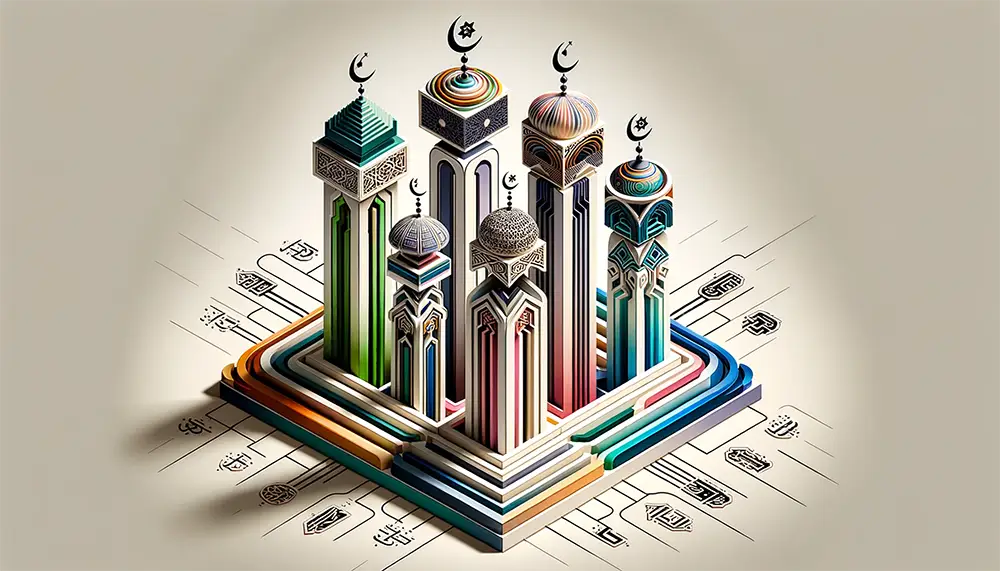Avoiding Common Mistakes in Understanding Islam

Introduction: Embracing Clarity in Islam
Islam, a religion of peace, spirituality, and deep-rooted beliefs, is often misunderstood in various aspects. For a True Momin (#MominToBe), it is essential to grasp the essence of ‘Avoiding Mistakes in Understanding Islam.’ This article aims to dispel common misconceptions, providing clarity on the profound and compassionate teachings of Islam, as practiced and preached by Muhammad Rasool Allah ﷺ under the guidance of Allah (اللّٰه).

A Symbol of Peace and Serenity in Islam
The Core Beliefs and Practices of Islam
Understanding Allah (اللّٰه): The Sole Deity in Islam
In the Islamic faith, Allah stands as the singular, omnipotent deity. This fundamental belief in one God, central to Islam, sets it apart from religions that envision God in multiple forms or associate partners with the divine. The Quran states,
Say, “He is Allāh, [who is] One, Allāh, the Eternal Refuge.
(Al-Ikhlas 112:1-2)
This underscores the concept of Tawhid, the oneness of Allah, a cornerstone of Islamic theology. The uniqueness of Allah is not just in being the only god but also in His attributes – He is omniscient, omnipresent, and the ultimate creator of everything.

The Infinite Universe: A Reflection of Divine Omnipotence
Prophet Muhammad (Muhammad Rasool Allah ﷺ): A Beacon of Guidance
Prophet Muhammad ﷺ, the last prophet in Islam, plays a pivotal role in conveying Allah’s message to humanity. His life, documented through Hadiths (sayings and actions of the Prophet) and Seerah (his biography), offers a comprehensive guide for Muslims. The Hadith
The Prophet (ﷺ) said, “None of you will have faith till he wishes for his (Muslim) brother what he likes for himself.”
(Sahih al-Bukhari 13)
highlights his teachings on compassion and empathy. Understanding his life in context is crucial for dispelling myths and appreciating his contribution to Islamic ethics and morality.

Guiding Light in the Journey of Faith
The Five Pillars of Islam: The Framework of a Muslim’s Life
The Five Pillars of Islam form the foundation of a Muslim’s practice and belief, guiding their spiritual and social conduct.

The Five Pillars: Foundation of Islamic Faith
Shahada (Faith)
The Shahada, the declaration of faith, is the first pillar. It involves professing, “There is no god but Allah, and Muhammad is the Messenger of Allah.” This affirmation is the entry point into Islam and the bedrock of a Muslim’s belief system.
Salah (Prayer)
Salah, the ritual prayer performed five times a day, fosters a direct link between the worshipper and Allah. It serves as a constant reminder of faith and keeps the believer grounded in Islamic principles. The Quran states,
Recite, [O Muḥammad], what has been revealed to you of the Book and establish prayer. Indeed, prayer prohibits immorality and wrongdoing, and the remembrance of God is greater. And Allah knows that which you do.
(Al-Ankabut 29:45)
emphasizing its moral and spiritual significance.
Zakat (Almsgiving)
Zakat, the obligatory charity, is not just an act of generosity but a duty to redistribute wealth and aid the less fortunate. It exemplifies the principles of social justice and community support in Islam.
Sawm (Fasting during Ramadan)
Sawm during the month of Ramadan is a time for spiritual reflection, self-improvement, and heightened devotion. Fasting from dawn until sunset, Muslims abstain from food, drink, and other physical needs, focusing instead on prayer, purification, and charitable acts.
Hajj (Pilgrimage to Mecca)
Hajj, the pilgrimage to Mecca, is a once-in-a-lifetime obligation for those who are physically and financially able. It is a demonstration of the solidarity of the Muslim people and their submission to Allah.
Misconceptions and Reality: Clearing Common Myths
Jihad and Peace in Islam: Understanding the True Essence
The term “Jihad” is often misunderstood, primarily due to its portrayal in media and public discourse. In Islamic theology, Jihad refers to a “struggle” or “effort” towards good. It encompasses both an internal, spiritual struggle against sin (Greater Jihad) and, when necessary, an external, physical struggle for justice and protection of the faith (Lesser Jihad). The spiritual aspect, which is central to the concept, focuses on self-improvement, moral integrity, and internal resilience against immoral tendencies.

The Path of Peace and Enlightenment in Islam
The Quran underscores this spiritual journey, stating,
And those who strive for Us – We will surely guide them to Our ways. And indeed, Allāh is with the doers of good.
(Al-Ankabut 29:69)
This verse highlights that the effort in the path of Allah is not limited to physical battles but extends to personal spiritual growth and contributing positively to society.
Women in Islam: Rights and Roles Beyond Stereotypes
Islam is often critiqued regarding the status and rights of women. However, a detailed examination of Islamic teachings reveals a religion that has historically empowered and uplifted women. The Quran states,
…And women have rights equal to their obligations in accordance with what is fair….
(Al-Baqarah 2:228)
which establishes a framework of equality and mutual respect.

Empowered and Diverse: Muslim Women in Various Roles
Education, a fundamental right for both genders in Islam, was emphasized by Prophet Muhammad ﷺ, who said,
Seeking knowledge is an obligation upon every Muslim.
Sunan Ibn Mājah 224
Islam’s history is rich with examples of educated and influential women, such as Aisha bint Abu Bakr, a renowned scholar of hadith and a key figure in Islamic history.
Islam and Science: A Legacy of Knowledge and Discovery
The relationship between Islam and science is one of harmony and mutual reinforcement. The Islamic Golden Age, a period from the 8th to the 14th century, witnessed remarkable advancements in science, mathematics, medicine, and astronomy, much of which laid the groundwork for the European Renaissance.

Fusion of Tradition and Innovation in Islamic Scholarship
The Quran itself encourages the pursuit of knowledge, as exemplified in the verse,
Say, [O Muḥammad], “Travel through the land and observe how He began creation. Then Allāh will produce the final creation [i.e., development]. Indeed Allāh, over all things, is competent.”
(Al-Ankabut 29:20)
This verse highlights the importance of exploration and understanding the natural world, a principle that drove many Muslim scholars to pioneer in various scientific fields.
Historical Context: Understanding Islam in its Time
The Rise of Islam: A Historical Overview
The emergence of Islam in the 7th century on the Arabian Peninsula marked a pivotal shift in religious and socio-political dynamics. Prophet Muhammad ﷺ, born in Mecca in 570 CE, received his first revelation in 610 CE, laying the foundation for the Islamic faith. The Quran, regarded as the verbatim word of Allah (اللّٰه), was revealed to him over 23 years.
Initially, Islam faced resistance and persecution in Mecca. The pivotal migration (Hijra) of the Prophet and his followers to Medina in 622 CE established the first Muslim community (Ummah) and marked the beginning of the Islamic calendar. In Medina, Islam flourished, and the Muslim community grew, leading to the eventual conquest of Mecca in 630 CE and the consolidation of the Arabian Peninsula under Islam.
The period following Prophet Muhammad’s ﷺ death in 632 CE saw the rapid expansion of Islam beyond Arabia during the caliphates of Abu Bakr, Umar, Uthman, and Ali – known as the Rashidun Caliphs. This expansion continued under subsequent dynasties, spreading Islam’s influence across vast regions, including Persia, North Africa, and parts of Europe.

Vibrancy of Early Islamic Civilization
Reform Movements in Islam: Adapting Through Ages
Throughout its history, Islam has experienced various reform movements aimed at reviving and purifying Islamic practices and beliefs. These movements have ranged from intellectual and spiritual reforms to socio-political and legal ones, each significantly impacting the contemporary understanding and practice of Islam.
The Golden Age of Islamic Scholarship
Between the 8th and 14th centuries, the Islamic world experienced a period of extraordinary intellectual growth, known as the Islamic Golden Age. This era saw advancements in sciences, mathematics, philosophy, and medicine, profoundly influencing the development of these fields globally.
The Sufi Movement: Spiritual Reawakening
The Sufi movement, with its emphasis on inner purity and personal experience of the divine, played a significant role in Islamic spirituality. Figures like Rumi and Al-Ghazali contributed to a deeper understanding of the Quran and Hadith, emphasizing love, tolerance, and introspection.
Contemporary Reform Movements
In the modern era, reform movements like Wahhabism and the Salafi movement have sought to return to what they view as the fundamental principles of Islam. These movements have generated significant discussion and debate within the Muslim world about the nature of Islamic practice and belief in the modern context.
Practices in Daily Life: Being a True Momin
Halal Lifestyle: More Than Just Food
Halal, an Arabic term meaning “permissible,” is often linked solely to dietary laws in Islam. However, its application extends far beyond food, permeating all facets of a Muslim’s life. This comprehensive lifestyle encompasses ethical decisions, personal conduct, financial dealings, and social interactions.
Ethical Consumption and Business Practices
In the realm of business and finance, Halal principles guide transactions to be fair, transparent, and devoid of exploitation. The prohibition of Riba (usury or interest) in financial dealings is a prime example, as stated in the Quran:
Those who consume interest cannot stand [on the Day of Resurrection] except as one stands who is being beaten by Satan into insanity. That is because they say, “Trade is [just] like interest.” But Allāh has permitted trade and has forbidden interest. So whoever has received an admonition from his Lord and desists may have what is past, and his affair rests with Allāh. But whoever returns [to dealing in interest or usury] – those are the companions of the Fire; they will abide eternally therein.
(Al-Baqarah 2:275)
This encourages ethical business practices and promotes social equity.
Personal Conduct and Social Interactions
Halal also governs personal behavior, advocating for honesty, integrity, and kindness in all interactions. The Hadith:
The Prophet (ﷺ) never used bad language neither a “Fahish nor a Mutafahish. He used to say “The best amongst you are those who have the best manners and character.”
(Sahih al-Bukhari 3559)
underscores the importance Islam places on ethical conduct and good character.
Prayer and Spirituality in Islam
Prayer (Salah) in Islam is not just a ritualistic practice but a profound spiritual exercise. It offers a structured approach to remembering and connecting with Allah throughout the day, fostering a sense of discipline, peace, and mindfulness.
The Five Daily Prayers: A Spiritual Anchor
The five daily prayers serve as a spiritual anchor in a Muslim’s life. They provide moments for reflection, gratitude, and seeking guidance. The act of Salah, involving physical movements and recitations, is a holistic practice engaging body, mind, and soul.
The Significance of Friday Prayer (Jumu’ah)
Friday prayer, Jumu’ah, holds special significance, being a weekly communal worship event. It is a time for Muslims to come together, listen to sermons (Khutbahs), and pray in congregation, fostering a sense of community and shared faith.
Overcoming Misunderstandings: Tips and Strategies
Educational Resources for Accurate Knowledge
In an era where misinformation about Islam is rampant, accessing reliable and authentic sources is crucial for accurate understanding. The following are key resources:
The Holy Quran
The Quran, the central religious text of Islam, is the primary source of Islamic teachings. Websites like Quran.com provide easy access to its verses with translations in various languages, facilitating understanding for non-Arabic speakers.

Accessing Islamic Knowledge in the Digital Age
Sahih Hadith Collections
Hadiths, the recorded sayings and actions of Prophet Muhammad ﷺ, are essential for understanding Islam’s practical aspects. Collections like Sahih Bukhari and Sahih Muslim are considered highly authentic and reliable. Websites such as Sunnah.com offer these hadiths with context and explanations.
Islamic Scholarly Websites
Websites run by Islamic scholars or educational institutions offer in-depth articles, fatwas (Islamic legal opinions), and Q&A sessions. Sites like IslamQA.info and SeekersGuidance.org are valuable for those seeking detailed understanding and guidance on specific Islamic matters.
Books on Islamic History and Culture
Books written by reputable scholars provide insights into Islam’s rich history and cultural diversity. Titles like “No god but God” by Reza Aslan or “Destiny Disrupted” by Tamim Ansary offer comprehensive overviews of Islamic history.
Interfaith Dialogue: Building Bridges
Effective interfaith dialogue is crucial for fostering understanding and respect among different faith communities. Here are strategies to facilitate constructive conversations:
Promoting Mutual Respect
Interfaith dialogue should be grounded in mutual respect. Recognizing and appreciating the values and beliefs of other religions is essential for meaningful engagement. The Quranic verse,
For you is your religion, and for me is my religion.
(Al-Kafirun 109:6)
encapsulates this spirit of tolerance and respect.
Focusing on Commonalities
Identifying common ground, such as shared values or similar historical experiences, can create a basis for meaningful dialogue. Emphasizing similarities rather than differences helps build empathy and understanding.
Engaging in Community Projects
Joint participation in community service projects can be a practical way to build bridges. Working together towards a common goal fosters camaraderie and breaks down barriers of misunderstanding.
Educational Exchange Programs
Organizing or participating in educational exchanges, where members of different faith communities learn about each other’s beliefs and practices, can dispel myths and promote knowledge.
Contemporary Challenges and Islam
Modernity and Tradition: Balancing Act for a Momin
In today’s rapidly evolving world, Muslims face the challenge of balancing traditional Islamic values with modern societal norms. This balance is not about compromising faith but about finding ways to live authentically as a Muslim in a contemporary context.
Integrating Islamic Values in Modern Life
One key aspect is integrating Islamic principles such as honesty, charity, and community service into modern professions and lifestyles. For example, engaging in ethical business practices aligns with Islamic teachings while adapting to contemporary economic systems.
Technological Advancements and Islamic Practices
Technological advancements offer new opportunities and challenges for Muslims. From using apps for prayer times and Quranic studies to navigating social media responsibly, technology can enhance religious practice but also requires discernment to avoid pitfalls.
Islamophobia: Causes and Countermeasures
Islamophobia, the irrational fear or hatred of Islam and Muslims, is a growing concern globally. Understanding its roots is key to developing effective countermeasures.
Roots of Islamophobia
Misinformation and stereotypes propagated through media and political rhetoric are significant contributors to Islamophobia. This fear is often based on a lack of understanding or exposure to Islam and its followers.
Strategies to Combat Islamophobia
- Education and Awareness: Increasing awareness about Islamic teachings and practices can dispel misconceptions.
- Community Engagement: Active involvement in local communities helps build bridges and fosters mutual understanding.
- Media Representation: Positive and accurate representation of Muslims in media can counteract negative stereotypes.
- Interfaith Initiatives: Collaborative efforts with other religious groups promote solidarity and counteract divisiveness.

Embracing Diversity and Knowledge in the Quest for Understanding
Conclusion: Fostering a Genuine Understanding
In conclusion, avoiding mistakes in understanding Islam requires a continuous effort in learning, open-mindedness, and promoting an authentic image of the faith. It involves not only correcting misconceptions but also actively engaging in practices that reflect the true essence of Islam – peace, compassion, and justice. As Muslims navigate the complexities of modern life, balancing tradition with modernity becomes a testament to the timeless relevance of Islamic teachings. For non-Muslims, understanding the multifaceted nature of Islam is crucial for fostering a world where differences in faith lead to mutual respect and coexistence rather than conflict and misunderstanding.
Frequently Asked Questions
- What is the true meaning of Jihad in Islam?
- Jihad in Islam primarily refers to the spiritual struggle within oneself against sin. It encompasses striving for moral integrity, personal growth, and the betterment of society. The term is often misunderstood due to its portrayal in media as solely related to physical conflict.
- How does Islam view women’s rights and roles?
- Islam grants significant rights and roles to women, including the right to education, property, and participation in social and political life. The Quran and Hadith emphasize the importance of respecting and empowering women, contrary to many stereotypes.
- What is the relationship between Islam and science?
- Islam encourages the pursuit of knowledge, including scientific inquiry. The Islamic Golden Age was marked by significant advancements in science and technology, illustrating the harmony between Islamic teachings and scientific exploration.
- How do Muslims balance traditional values with modern life?
- Muslims balance tradition and modernity by adhering to core Islamic values while engaging with contemporary society and advancements. This involves applying Islamic principles to modern challenges and using technology and modern resources to enhance their understanding and practice of Islam.
- What are the causes of Islamophobia and how can it be addressed?
- Islamophobia often stems from misinformation, negative media portrayals, and political rhetoric. Addressing it involves education, interfaith dialogue, community engagement, and promoting positive narratives about Islam and Muslims.
- What are the Five Pillars of Islam?
- The Five Pillars of Islam are Shahada (faith), Salah (prayer), Zakat (almsgiving), Sawm (fasting during Ramadan), and Hajj (pilgrimage to Mecca). These pillars form the foundation of a Muslim’s practice and belief system.
Lorem Ipsum

